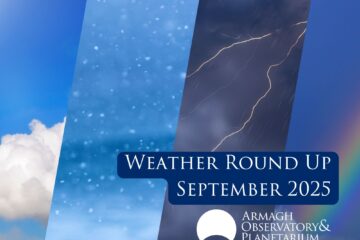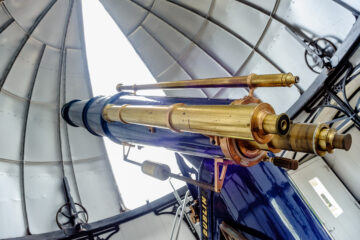FEBRUARY DULLER THAN AVERAGE BUT DRIEST AND WARMEST AT ARMAGH FOR 25 YEARS. WINTER 2022/2023 DRIER AND WARMER THAN AVERAGE, WITH ABOUT AVERAGE SUNSHINE.
Armagh Observatory reports that February 2023 was duller than average but the driest and warmest February at Armagh for 25 years. The month was dominated by high pressure, with no gales or named storms. The meteorological winter, taking the three months December 2022, January 2023 and February together, was drier and warmer than average but with roughly average sunshine.
Total precipitation was 15.9 mm (0.63 inches) including 6 trace values, that is, 15.6 mm if trace values are ignored. This is approximately 29% of the 183-year long-term (1838–2020) average February precipitation at Armagh (55.49 mm) and 27% of the most recent (1991–2020) 30-year average (59.02 mm).
This was the eleventh-driest February at Armagh since daily rainfall records began in 1838 and the driest for 25 years, that is, since February 1998 (15.7 mm). This is in marked contrast to last February, which was the ninth-wettest February on record (111.8 mm). Among ten days this February with measurable precipitation the wettest was the 1st with just 3.4 mm of rainfall, followed by the 15th with 3.2 mm and the 8th with 2.6mm.
In further contrast to last February, which had three named storms in a week, this February was remarkably calm for a winter-month. There were no gales or named storms, and the weather was dominated by high pressure. The mean monthly pressure reduced to mean sea level, approximately 1027 mbar, was much higher than the corresponding 170-year (1851–2020) long-term February average (1013 mbar), ranking this February in the top half-dozen among highest average February pressures at Armagh.
This month also recorded the highest atmospheric pressure ever recorded during February at Armagh. Data from the Automatic Weather Station showed the pressure reduced to mean sea level peaked at approximately 1046.9 mbar shortly after 5.00 am on the morning of the 5th.
Gulls were seen on most days, notably on the 2nd when a group of about half a dozen birds were seen harrying a buzzard, and on the 6th when approximately 30 gulls were seen flying south over the Observatory. Two days later a lone duck was also seen flying south. A rook from the rookery near the weather station was seen chasing a gull on the 23rd. This February being much warmer than average there was no sleet or snow, and hail was reported on just one day, namely the 22nd. A rainbow was seen on the morning of the 15th.
The monthly mean temperature was an exceptionally mild 7.4 degrees Celsius (45.4 Fahrenheit). This was nearly 2.8 C warmer than the 225-year (1796–2020) long-term. February average at Armagh (4.65 C) and 2.1 C warmer than the most recent (1991–2020) 30-year average (5.33 C). This was the warmest February at Armagh for 25 years, that is, since the record-breaking February 1998 (8.3 C), and the fourth-warmest February at Armagh on record.
This result continues the trend towards warmer-than-average Februarys at Armagh, with each of the last five Februarys being warmer than the most recent 30-year average. The five warmest Februarys at Armagh are now February 1998 (8.3 C), February 1945 (7.7 C), February 1961 (7.5 C), February 2023 (7.4 C), and February 2019 (7.3 C). Recent 30-year averages for February show the same trend, increasing between 1961–1990 (4.25 C) and 1991–2020 (5.33 C) at an average rate of approximately 0.35 C per decade.
The highest maximum air temperature, which is usually the warmest day, was 13.8 C on the afternoon of the 14th followed by 12.8 C on the 20th and 12.4 C on the 19th. The lowest maximum air temperature, or coolest day, was 6.8 C on both the 27th and 28th, followed by 8.3 C on the 9th.
The highest minimum air temperature, 9.3 C, occurred on the 2nd (although conventionally attributed to the 3rd), followed by 8.8 C on the 17th (although conventionally attributed to the 18th). The lowest minimum air temperature, or coolest night, was -1.8 C on the 5th.
There were 12 nights with ground frost, that is, with a minimum grass temperature less than or equal to zero Celsius, the coolest two of which were -7.7 C on the 5th followed by -7.5 C on the 27th. There were four nights with minimum air temperatures less than or equal to zero Celsius, that is, with night-time air frosts.
With 47.9 hours of strong sunshine, February 2023 was much duller than average, recording just 73% of the 140-year (1881–2020) long-term average number of hours of strong sunshine at Armagh (65.4 hours) and a little over 67% of the most recent (1991– 2020) 30-year average (70.9 hours). This was the dullest February at Armagh for six years, that is, since February 2017 (43.2 hours). The sunniest day was the 25th with 7.0 hours of strong sunshine, followed by the 5th with 6.2 hours and the 26th with 4.5 hours.
Taking the three months December 2022, January 2023 and February together, the meteorological winter 2022/2023 was drier and warmer than average with about average sunshine. With a total of 150.2 mm of precipitation including 16 trace values this was the driest winter at Armagh for six years, that is, since winter 2016/2017 (127.35 mm including 15 trace values).
The average winter temperature was an unremarkable 5.46 C. Whereas December 2022 was unusually cool, both January 2023 and February were warmer than average. This led to winter 2022/2023 being nearly 1.0 C warmer than the 225-year (1796–2020) long-term winter average at Armagh (4.48 C) and approximately 0.25 C warmer than the most recent (1991–2020) 30-year winter average (5.21 C).
Total winter sunshine was 156.0 hours, approximately 4% more than the 140-year long term (1881/1882–2020/2021) winter average at Armagh and approximately 3% less than the most recent 30-year average (161.5 hours).
These data refer to observations at Armagh Observatory, which has been recording the weather at Armagh since 1795.
FOR FURTHER INFORMATION PLEASE CONTACT: Mark Bailey at the Armagh Observatory, College Hill, Armagh, BT61 9DG. Tel.: 028-3752-2928




0 Comments